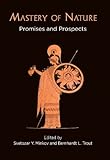Mastery of Nature : Promises and Prospects / ed. by Svetozar Y. Minkov, Bernhardt L. Trout.
Material type: TextPublisher: Philadelphia : University of Pennsylvania Press, [2018]Copyright date: ©2018Description: 1 online resource (288 p.) : 1 illusContent type:
TextPublisher: Philadelphia : University of Pennsylvania Press, [2018]Copyright date: ©2018Description: 1 online resource (288 p.) : 1 illusContent type: - 9780812294866
- 113 23
- online - DeGruyter
| Item type | Current library | Call number | URL | Status | Notes | Barcode | |
|---|---|---|---|---|---|---|---|
 eBook
eBook
|
Biblioteca "Angelicum" Pont. Univ. S.Tommaso d'Aquino Nuvola online | online - DeGruyter (Browse shelf(Opens below)) | Online access | Not for loan (Accesso limitato) | Accesso per gli utenti autorizzati / Access for authorized users | (dgr)9780812294866 |
Frontmatter -- Contents -- Preface -- Introduction -- I. The Project for Mastery -- Chapter 1. Machiavelli and the Discovery of Fact -- Chapter 2. The Place of the Treatment of the Conquest of Nature in Francis Bacon’s On the Wisdom of the Ancients -- Chapter 3. Hobbes on Nature and Its Conquest -- Chapter 4. Devising Nature: An Essay on Descartes’s Discourse on Method -- Chapter 5. Montesquieu, Commerce, and Science -- Chapter 6. Bacon and Franklin on Religion and Mastery of Nature -- II. Ancient Alternatives and Anticipations -- Chapter 7. On the Supremacy of Contemplation in Aristotle and Plato -- Chapter 8. Xenophon and the Conquest of Nature -- Chapter 9. Lucretius on Rebelling Against the “Laws” of Nature -- III. Consequences, Critiques, and Corrections -- Chapter 10. Jean-Jacques Rousseau: Return to Nature vs. Conquest of Nature -- Chapter 11. Kant on Organism and History: Ambiguous Endings -- Chapter 12. Beyond the Island of Truth: Hegel and the Shipwreck of Science -- Chapter 13. Separating the Moral and Theological Prejudices and Taking Hold of Human Evolution -- Chapter 14. Mastery of Nature and Its Limits: The Question of Heidegger -- Chapter 15. What Is Natural Philosophy? The Perspective of Contemporary Science -- Chapter 16. Quantum Mechanics and Political Philosophy -- Notes -- List of Contributors -- Index -- Acknowledgments
restricted access online access with authorization star
http://purl.org/coar/access_right/c_16ec
In the early modern period, thinkers began to suggest that philosophy abjure the ideal of dispassionate contemplation of the natural world in favor of a more practically minded project that aimed to make human beings masters and possessors of nature. Humanity would seize control of its own fate and overthrow the rule by hostile natural or imaginary forces. The gradual spread of liberal democratic government, the Enlightenment, and the rise of technological modernity are to a considerable extent the fruits of this early modern shift in intellectual concern and focus. But these long-term trends have also brought unintended consequences in their wake as the dynamic forces of social reason, historical progress, and the continued recalcitrance of the natural world have combined to disillusion humans of the possibility—even the desirability—of their mastery over nature.The essays in Mastery of Nature constitute an extensive analysis of the fundamental aspects of the human grasp of nature. What is the foundation and motive of the modern project in the first place? What kind of a world did its early advocates hope to bring about? Contributors not only examine the foundational theories espoused by early modern thinkers such as Machiavelli, Bacon, Descartes, and Hobbes but also explore the criticisms and corrections that appeared in the works of Rousseau, Kant, Nietzsche, and Heidegger. Ranging from ancient Greek thought to contemporary quantum mechanics, Mastery of Nature investigates to what extent nature can be conquered to further human ends and to what extent such mastery is compatible with human flourishing.Contributors: Robert C. Bartlett, Mark Blitz, Daniel A. Doneson, Michael A. Gillespie, Ralph Lerner, Paul Ludwig, Harvey C. Mansfield, Arthur Melzer, Svetozar Y. Minkov, Christopher Nadon, Diana J. Schaub, Adam Schulman, Devin Stauffer, Bernhardt L. Trout, Lisa Van Boxel, Richard Velkley, Stuart D. Warner, Jerry Weinberger.
Mode of access: Internet via World Wide Web.
In English.
Description based on online resource; title from PDF title page (publisher's Web site, viewed 30. Aug 2021)


